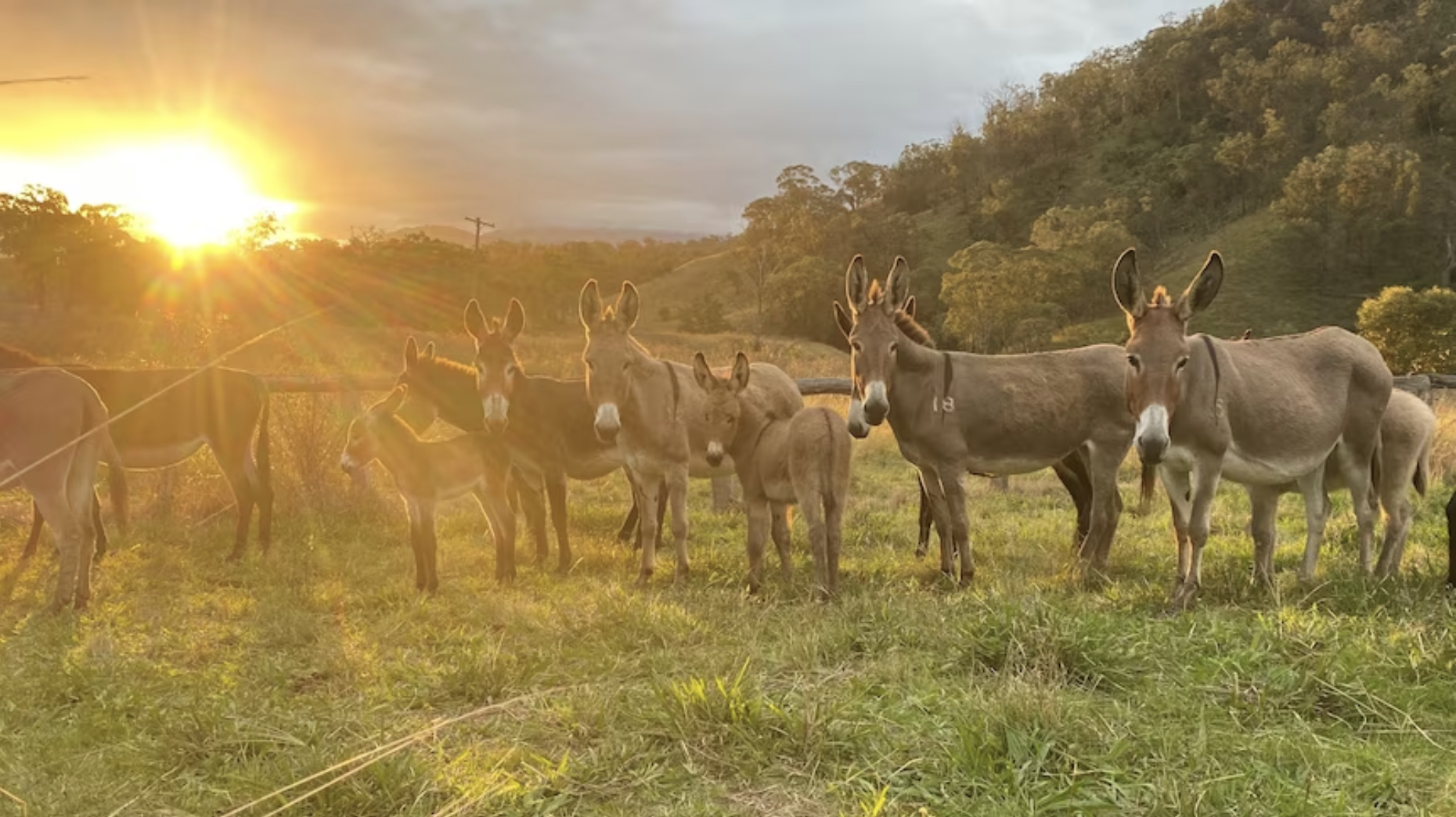
Livestock Guardian Donkeys
Image: Brooke Purvis
Livestock guardian donkeys are becoming more popular across Australia, as an increasing number of landholders discover their effectiveness in protecting livestock from predators. Donkeys can successfully protect livestock across a range of regions, climates and types of livestock.
The success of donkeys guarding livestock has been documented around the globe. Guardian donkeys have been proven effective with international predators such as wolves and coyotes, and there is increasing anecdotal evidence of their success in protecting livestock from dingoes in Australia too.
There are estimated to be five million feral donkeys across arid central Australia, the Kimberley in Western Australia and the Top End in the Northern Territory. They cause damage to the environment and compete with livestock for pasture, and as a result are controlled through mustering and aerial shooting.
In recent years, the Last Stop Donkey program has been developed to remove donkeys from areas where they cause damage, relocating them and retraining them to become effective guardians of livestock. The program, which is located in the Hunter Valley of NSW, has been highly successful and is an excellent example of a program that could be adopted in other regions to support landholders in protecting their livestock from predation by dingoes.

Why are donkeys desirable guardians?
Adaptability: Donkeys are able to integrate with various types of livestock in a range of different environments.
Low maintenance: Donkeys are generally low-maintenance animals and have the same diet as livestock animals, which can be supplemented with hay when needed. It is important to note that donkeys still require regular feet, dental and worming treatment to keep them healthy, and ensure they work reliably.
Territorial behaviour: Donkeys are territorial by nature and will bray, kick and bite in defence against predators.
Vocal deterrence: Donkeys are vocal animals and will bray loudly when they sense incoming danger. This can not only alert farmers and other guardian animals to approaching danger, but deter dingoes from approaching.
Physical deterrence: Donkeys are much larger than dingoes and can intimidate or challenge dingoes, which acts as a deterrent and prevents dingoes from attacking livestock.
Long term protection: With proper care and living conditions, donkeys can have a lifespan of 27-50 years, meaning they can provide decades of protection for livestock.
Determining the correct ratio of donkeys needed to protect your livestock
In open paddocks that allow donkeys a good line of sight, use approximately 1 pair of donkeys to 200-300 sheep. In hilly or scrubby paddocks, there should be 1 pair of donkeys to 100 sheep.
For extensive situations there should be 1 donkey pair per sheep camp.

Proper care and treatment
To ensure donkeys work well, there are some basic care requirements that need to be met. While they are fairly low-maintenance animals, it is important that donkeys' feet, teeth, regular worming and tetanus vaccinations are kept up to date.
The frequency of foot trimming depends on the individual donkey and the terrain that they are kept in, but generally hoof trimming should be undertaken every 8-10 weeks. It is recommended that donkeys have a dental check up once a year to identify any potential dental issues such as overgrown teeth and sharp edges. Donkeys should be treated regularly for worms to ensure they don’t develop a worm burden, which can impact their health and consequently, their ability to guard. Donkeys are also required to be vaccinated against tetanus, as they are particularly susceptible to the bacteria tetanus produces. In donkeys, tetanus is lethal in 80% of cases.
For ease of performing these tasks, it is recommended that a crush is located on the property. It is important to note that you should never put a donkey's neck in a crush, this can break their neck. The crush is used to contain them in a small area while performing health maintenance.
Initial costs of purchasing a donkey as a guardian
The price range for a donkey can be between $900 and $4,500. However, the cost to purchase a guardian donkey depends greatly on the amount of training and health care they have received prior. Whilst it may be enticing to buy a donkey at a lower initial price, this does come with significant risk of costing more in the long run.
If a cheaper donkey is opted for, it is highly likely that there has been a lack of proper training to ensure they will be suitable guardians. This can lead to poor guarding, damaged infrastructure and, in extreme cases, injury or death of livestock animals.
Look for donkey retrainers who have tested donkeys in a range of situations (including around children) and who can offer ongoing support and information after purchasing a donkey. Looking for donkey retrainers who know the age of the donkey, and ensure they are vet checked, microchipped, vaccinated, registered and up to date with worming, dental and feet work is also important. Lastly, a reputable donkey retrainer should know the strengths and weaknesses of the individual donkeys in their care and can recommend which donkey will be most suitable to individual circumstances.
Ongoing costs associated with livestock guardian donkeys
Donkeys success in action across Australia
One donkey supplier in regional NSW has claimed a 300% increase in farmers seeking donkeys to protect livestock from dingo predation.
Further, a NSW farmer had a persisting issue with predation by dingoes, with up to 30 sheep killed on the property each night. In the 3 years since deploying 2 trained donkeys on the property to protect livestock, no killings by dingoes have been recorded.
A farmer in Grafton also decided to utilise guardian donkeys to protect their herd from predation and asserts they were an ‘instant success’.
You can find a list of other guardian donkey successes on the Dingo Advisory Council website:



